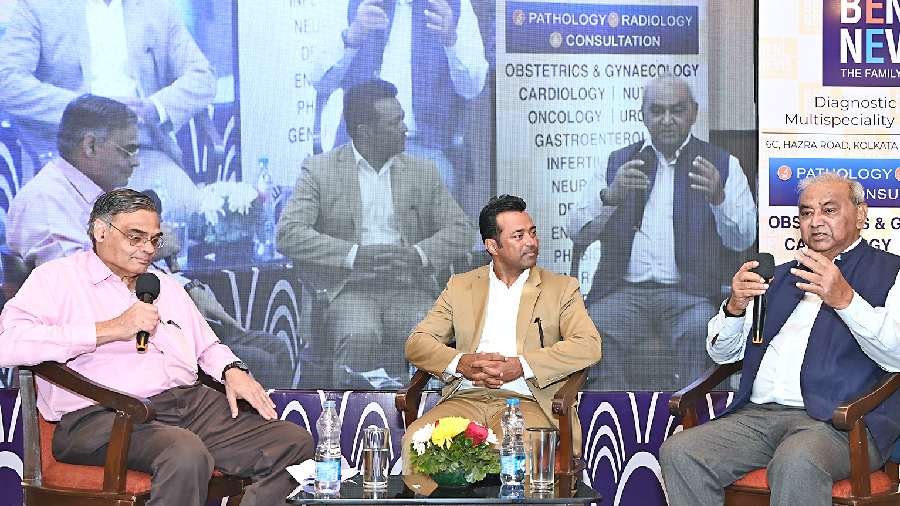Leander Paes’s life flashed in front of us giving us a quick recap of his illustrious three-decade-old career— from scripting history at the Olympics to fulfilling India’s Wimbledon dream to winning multiple Grand Slam titles and setting unbeatable records at Davis Cup. All this, post the launch of a privilege card for the sports fraternity by Ben Nevis Diagnostic Centre and Multispeciality Family Clinic at The Bengal Club on March 12. The short video filled us all with pride and warmed us up for an immersive session with Leander, moderated by Dr Sandip Chatterjee. The evening saw Leander share interesting anecdotes from his life.
One of the first questions Dr Chatterjee asked was of all the awards he’d won, which one he treasured the most and why? Of course, it had to be the historic moment when he bagged India’s first individual Olympic medal, after 44 years, in 1996. “I had just won India its first individual Olympic medal (in 44 years) and it wasn’t that moment that defined me but after that when I came to my dad and he said, ‘Ok, tonight you can come to the dining table and eat with me’,” recounted Leander.
Why were doubles such a favourite? “I thrive in a team environment because I have the ability to find my individuality within the team. Also, I have the ability to bring out the best in others,” said the former tennis player who holds the record of playing in seven Olympics and is the lone one from India with a tennis Olympics medal to his name.
Paes also spoke about the untapped talent in India and how he wanted to use the combined experience of his father and his and use it to change the way Indian sports function. “I think that more than 50 per cent of the talent in India, across professions, is untapped. We are the youngest country in the world with over 50 per cent of the population under the age of 26 and that would make 745 million kids. We Indians are very cerebral, and we are great with numbers… but what hurts me is that most of our great brains, across professions, leave the Indian shore for a better life abroad. And for me, my next journey, now that I have completed 31 years of my career, is to capture 60 years of Baba’s practical experience and 40 years of being his guinea pig and put it in a curriculum and redesign the physical education in a school. Today the big thing in sports is vision. India is so far behind in sports science and medicine and I would love to tap into all the cerebral brains here and create champions methodologically, not by luck or one family’s perseverance. There’s no systematic nurturing of talents in Indian sports other than cricket. And instead of complaining we should learn from cricket. For me, sports is not about being a Tendulkar or any legend but it’s about good health, great quality of life, it’s about getting people together,” he said.
The evening took an interesting turn when Chatterjee asked a question that is often on the minds of tennis enthusiasts who loved the Leander Paes-Mahesh Bhupathi pair: ‘What if you had played with Mahesh Bhupathi a little longer? Do you think you would have broken more records?’ “And if I hadn’t played with Mahesh you wouldn’t have these records. Perspective!” quipped the legend. Answering the question he said: “Most people would tell me ‘Tumhara aukaat kya hai? Wimbledon pehle khelo to sahi’. But I had a dream that we two young boys could win Wimbledon. Mahesh laughed at me but I must say he put in 10 years of hard work. The relationship between me and Mahesh is a unique one because we know we have created history and proven to every young kid that if they have a dream to achieve then they can do it too like us. Where do we differ? Mahesh and I are the yin and yang and it’s not right for me to sit here and not give him a chance to defend himself. I know where I was wrong. I felt like the elder brother, as much as I had the vision to see that we could win Wimbledon, as much as I had the team to get us to be the No.1, I never had the vision of what happens after we win the Wimbledon; what happens after you become World no. 1? As an elder brother may be I could have done something differently or had more foresight.”
The talk veered towards Peas’ affinity to Calcutta. “I am so proud that I come from Calcutta and have that Bengali or Goan or Indian heritage. The value system that we grow in Calcutta is cherishable.”
Giving out a few pieces of advice he said, “You are going to have great times and not-so-great times, that’s how life is; life will always challenge you. But if you can stay balanced and stable you can win a lot of battles.”
Did he miss tennis? “After travelling for 31 years and squeezing the last drop of passion and love for the game of tennis that I have, I don’t miss tennis. I get excited by the other things in life that I have not done like golfing, and deep diving. I also get excited about mundane things like sleeping on my own bed! Because I have slept in locker rooms, got mugged once and didn’t have a dollar in my pocket. But what I do enjoy is using sports as a vehicle in an Olympic movement. For me, the fun part of being back in Calcutta is life has come full circle. Now I would love one of our kids to go there and win a medal at the Olympics or make it big in sports science,” signed off the man who changed the face of Indian tennis and who encouraged others to dream big and achieve it too.
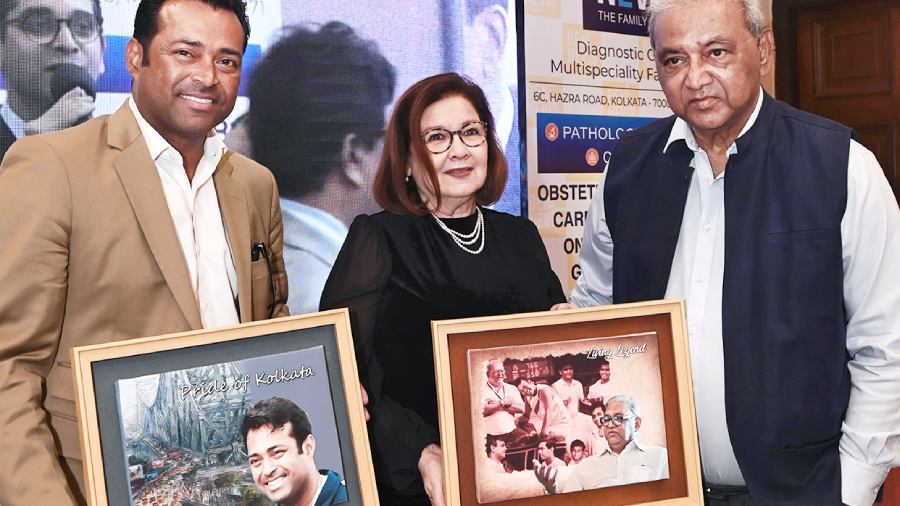
Leander with Juliana Van Steensel and father Vece Paes, post the talk.
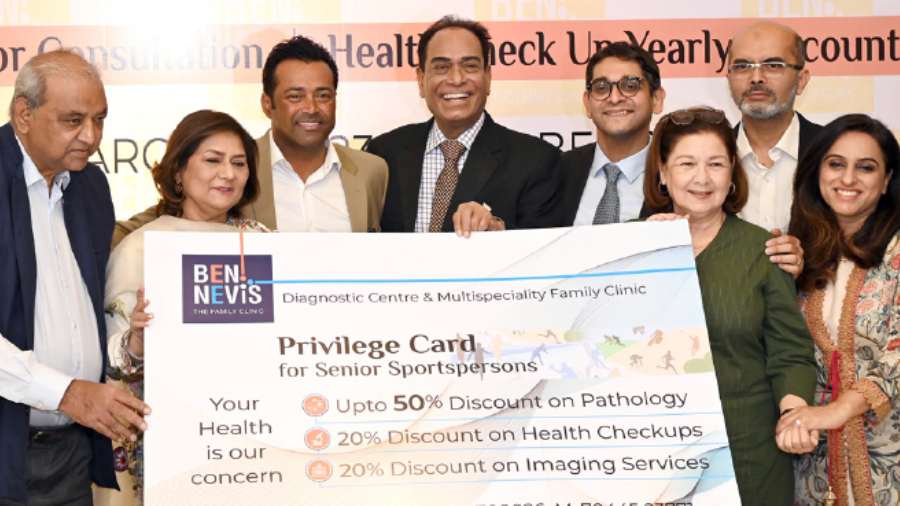
Ben Nevis Diagnostic Centre and Multispeciality Family Clinic launched a privilege card for the sports fraternity and handed over its first card to Dr Vece Paes, Olympian, former Indian hockey midfielder and proud father of ace tennis player Leander Paes. From left: Dr Vece Paes, Iti Dasgupta, Leander Paes, Dr Pronab Dasgupta, Dr Arnab Dasgupta, Juliana Van Steensel, Dr K.N. Siddiqui and Anindita Dasgupta. Informing the audience of the partnership between his father and Dr Dasgupta in making healthcare more accessible to people, Leander said, “Ever since I can remember, I have seen my baba and doc (Dr Dasgupta) work together and start health check-up clinics and do annual check-up for corporates.” He added, “I was born with a mitral valve prolapse and had to do a lot of health check-ups twice a year. Just like doctor Siddiqui talked about preventive medicine, my parents practised that. Mostly in our country, we go to the doctor when we have an ailment. But baba would create a routine where I would get the tests done on time, regularly. We always make sure good health is primary. Through Ben Nevis, we can create a healthier community and I so encourage healthy individuals to get their health check-ups done not once but twice a year.”
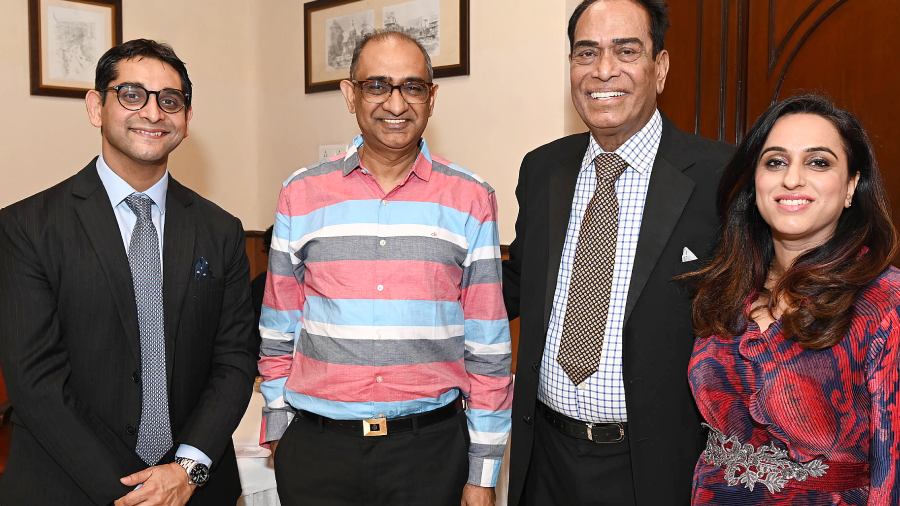
Ben Nevis managing director Dr Arnab Dasgupta (extreme left) poses with Imran Zaki, father Dr Pronab Dasgupta and wife Anindita. “I got the interest because two of my very good friends who were also sportsmen died recently. So we decided to introduce this privilege card for people in the sports fraternity, in their post-60, with discounts on tests and medical care in hospitals,” said Dr Pronab.Designer Kiran Uttam Ghosh
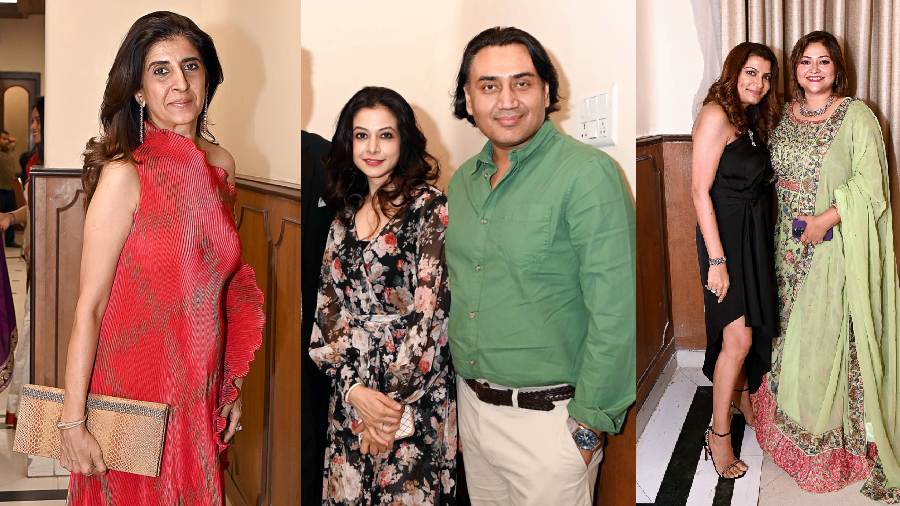
Designer Kiran Uttam Ghosh (left), Koel Mallick dropped by with husband Nispal Singh (centre) and Jyotee Khaitan and Koneenica Banerjee (right)
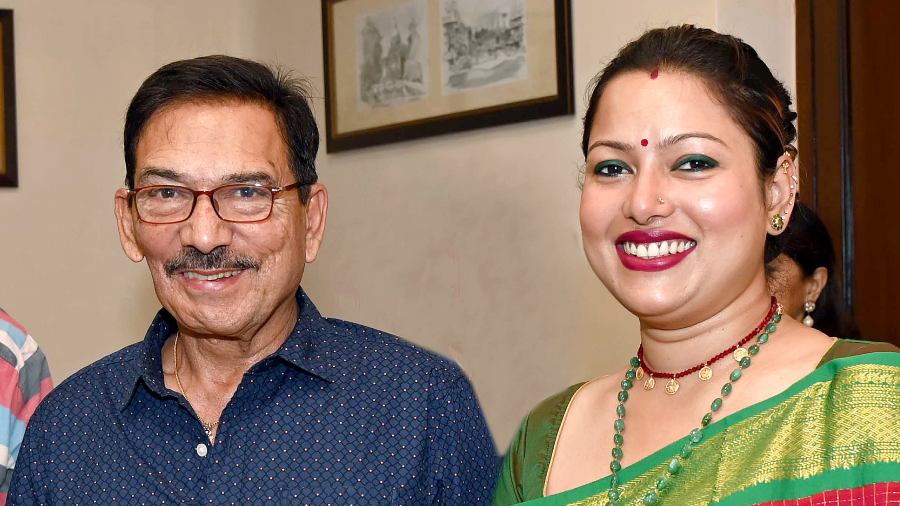
Former cricketer Arun Lal with wife Bulbul Saha
